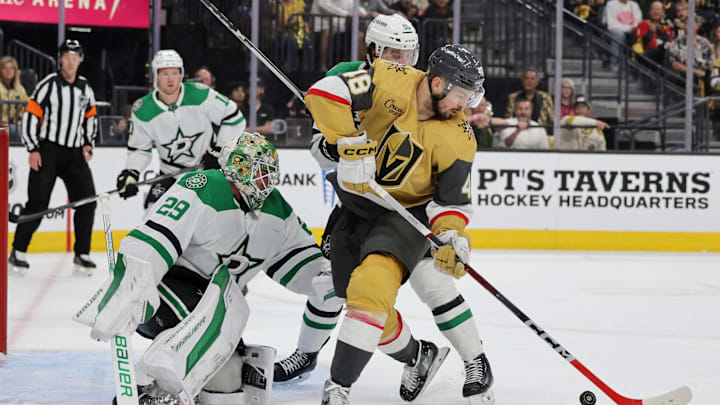Imagine this scenario, dear reader. It's the final game of the 2027 Western Conference Final. The Vegas Golden Knights are facing off against the Dallas Stars, with Vegas looking to end Pete DeBoer's undefeated record in the deciding game. The game is tied, 2-2, with the Golden Knights on the power play with two minutes left.
Mark Stone has a good view from the point with Tomas Hertl obstructing Jake Oettinger's view. The Captain fires a shot that ricochets off Hertl and behind Oettinger for a goal! Vegas has a 3-2 lead and T-Mobile Arena is going crazy! Cue up Panic at the Disco because it puts the Golden Knights ahead and closer to the Stanley Cup Final.
Except... it doesn't. The goal gets called off because the referee (probably Wes McCauley) said Hertl bumped into the goaltender, causing goaltender interference. The goal is waived off, T-Mobile boos the decision loudly, and the game goes into overtime. In the extra period, Wyatt Johnston ends the game with a goal that sends the Stars to the Stanley Cup Final. The local radio stations are lit up with takes on whether it was a good call.
The definition of goaltender interference (and the Vegas Golden Knights nightmare)
Now that's a nightmare if I've ever seen one. Having the series-clinching goal ripped away from you because of a bad call from a referee would hurt any fan. The Vegas Golden Knights know something about this, for it happened to them in 2019. A cross-checking call that shouldn't have been a major cost them against the San Jose Sharks in the first round.
But let's turn back that nightmare scenario and learn what goaltender interference means. According to Hockey Canada, it's defined as the following (Rule 8.5):
"Goaltender interference refers to any attacking player who, by means of their stick or body, interferes with or impedes the movements of the goaltender by actual physical contact."Hockey Canada (Rule 8.5)
Yes, there might be some accidental contact that happens in specific scenarios. However, those same attacking players must do whatever they can to avoid contact by any means. If they don't abide, the offending player will be penalized. On the contrary, goaltenders can be punished for committing infractions within their own goal. If the offending player injures a goaltender intentionally, that results in a match penalty.
Let's forget that nightmare scenario involving Tomas Hertl and Jake Oettinger for now. The Golden Knights have had a heartbreaking call before and don't need another. Let's focus on the upcoming season, which offers the opportunity to bring home another Stanley Cup. After all, hockey season starts in less than three months.
